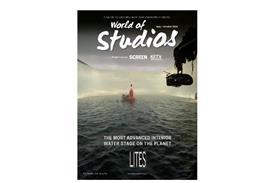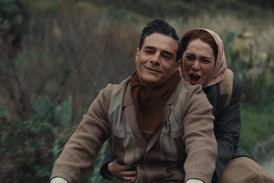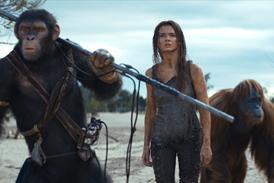As a filming location, Poland is building a reputation as a healthy alternative to its bigger, more established neighbours. In recent years, major productions such as The Chronicles Of Narnia films and David Lynch's Inland Empire have been lured by Poland's cheap costs, contrasting scenery and established reputation as a film-making country.
Walden Media and Walt Disney Studios Motion Pictures shot most of Prince Caspian in the Czech Republic, and were tempted across the border into Poland earlier this year. "Poland has incredibly beautiful forests and national parks and we found two (in Kudowa Zdroj and Karkonoski) right across the Czech border. It was logistically very easy to move up there," says the film's producer, Mark Johnson.
He was also impressed by local production company Ozumi Films, which has assisted several major international productions over the years. "(Line producer) Marianna Rowinska was an absolute pleasure to work with."
Further enticement for international producers comes in the shape of no-strings-attached soft money funding from the Polish Film Institute (Pisf). It administers an annual budget of $47m-$55m (zlo103m-zlo121m), of which 60% is earmarked for production and can be accessed by foreign producers, regardless of the project's origin, language or subject matter.
"We're not just looking for projects that have something to do with Poland. Our conditions are flexible," says Pisf deputy director Maciej Karpinski. "We don't distinguish between international productions or Polish productions. We grant money to the best project."
Pisf funds are usually awarded in amounts up to 50% of a project's total budget. International co-productions can generally receive up to 85% of the Polish producer's participation. The Polish minority co-producers and service providers on European feature films - films set in the European Union (EU) or the European Economic Area - can apply for an additional subsidy, loan or guarantee of up to $460,000 (zlo1m); Polish partners on non-European films can apply for up to $368,000 (zlo810,500).
For both forms of funding, producers submit budgets and invoices to the Pisf. A panel comprised of Polish industry figures decides how much to award to which project.
Peter Greenaway's Nightwatching was among the first international projects to benefit from Pisf funding after the foundation was established in 2005. Others include Ken Loach's It's A Free World, Inland Empire, Sergei Dvortsevoy's Tulpan and Petr Zelenka's Karamazovi.
Marleen Gorris' Within The Whirlwind, a $9.8m English-language international co-production, which shot in Poland earlier this year, secured 20% of its budget from the Pisf.
Respected local film-maker Agnieszka Holland has also accessed $1.6m (zlo3.5m) from the Institute for her upcoming $10.5m (zlo23m) epic The True Story Of Janosik And Uhocik, which is set to shoot in the Tatra mountains in southern Poland from July.
An adaptation of Terrence McNally's play Master Class, produced by Faye Dunaway, is also understood to be considering the territory, as is a European biopic of Polish-born scientist Marie Curie.
But this increased international attention has made the local industry painfully aware it lacks high-end production facilities. Although most international projects filming in Poland - including Roman Polanski's The Pianist, Inland Empire and Within The Whirlwind - shot only on location, there are some stages in the country but most are poorly equipped.
Nightwatching shot at an old but serviceable studio at the Wroclaw Feature Film Company in Wroclaw. In Lodz there is the Lodz Film Centre, which offers a 770sq m stage, and Opus Film, which has four stages, the largest being 824sq m. In Warsaw, Farat Film offers two modern soundstages (1,200sq m and 900sq m) and the Warsaw Documentary and Feature Films Studio has four soundstages (two 600sq m, one 450sq m and one 200 sq m).
But Poland lacks the kind of stages found in neighbouring Germany and the Czech Republic. Plans for Film City, a huge production facility outside Warsaw, have stalled over ownership rights.
Meanwhile in Lodz, David Lynch is moving ahead to convert an old power plant into a European film centre and studio, which will comprise a small (approximately 8,600sq ft) production set, a symphonic recording hall and post-production facilities. The city of Lodz is contributing $3m (zlo6.6m) towards the $70m (zlo154m) project and the studio is expected to be up and running some time in 2009.
International producers have also noted the lack of English-speaking crews, but most have found ways around the problem. "We had a Polish-German-Belgian team, so there were lots of languages, but the main language was English," Gorris says of her experience shooting Within The Whirlwind.
Poland also has the attraction of its quality film history, with names such as Krzysztof Kieslowski, Polanski and Andrzej Wajda.
Australian cinematographer and director Christopher Doyle says he had considerable respect for Polish film-making before Ozumi Films approached him to direct political thriller Warsaw Dark, which shot in Warsaw for a month earlier this year.
"The respect the Poles have for directors and cinematographers raises what we do, from just another film ... to a celebration of the story to be shared," Doyle suggests.
THE FIXERS
PIOTR MULARUK, YETI FILMS
As head of Yeti Films, Mularuk has served as co-producer on Marleen Gorris' Within The Whirlwind, Peter Greenaway's Nightwatching, Florian Gaag's Wholetrain, and Yuma, a Poland-Germany co-production he will direct from his own script.
Contact: piotr.mularuk@ yetifilms.com
MARIANNA ROWINSKA, OZUMI FILMS
Rowinska has worked as a line producer on The Chronicles Of Narnia: Prince Caspian and as a production supervisor on The Lion, The Witch And The Wardrobe. Other credits include Roman Polanski's The Pianist and Michael Glawogger's Contact High. She has also been a producer on Christopher Doyle's Warsaw Dark and Jerome Dassier's Limo Driver. Her company, Ozumi Films, has numerous features, documentaries and television projects in various stages of production.
Contact: marianna@ ozumifilms.com
ANDRZEJ BESZTAK, MS FILMS
Besztak has worked as a production manager or co-ordinator on several key international titles that have shot in Poland, including Within The Whirlwind, Nightwatching, The Aryan Couple, Schindler's List and The Pianist.
Contact: abesztak@msfilms.pl
WORD OF MOUTH: INTERNATIONAL FILM-MAKERS SHARE THEIR POLISH EXPERIENCES
Q&A
Name: Erich Lackner, founder, producer, Lotus Film
Production: Contact High, Austrian director Michael Glawogger's comedy about four men in Vienna, shot for 11 days in Lubliniec, 15 days in Lodz, one day in Wroclaw and one day in Cieszyn in August/September last year, as well as a week in Vienna. It is an international co-production between Lotus Film (Austria), Ozumi Films (Poland), Boje-Buck (Germany) and Iris Productions (Luxembourg).
Why did you decide to shoot in Poland'
Poland was already part of the script. More than half the story is located there. The original plan was to shoot exteriors in Poland only, which would have come to about two weeks of filming. Due to the support from the Polish Film Institute and a good co-production partner in Poland, we ultimately shot five weeks in Poland, all on original locations.
What were your cost savings'
We shot in Poland only partly due to financial reasons. Savings in crew, locations, construction and props is substantial. But on the other side there is additional cost for the foreign crew and for logistics, transport and hotels and so on.
How did you find working with local crews'
It was basically a good experience. But there is a different mentality and some language problems and barriers. Communication needs a lot of time. We also needed some time to adapt to the Polish system, which works the same as in the US, but different to Austria and Germany where the organisation is quite different (for example, first assistant directors and location managers perform different tasks in Poland than they do in Austria).
Which person or company on the ground was indispensable'
We were lucky to have an excellent co-producer, Ozumi Films, which we recommend strongly and would definitely involve in an upcoming project in Poland.
What does Poland need to bolster its status as a first-class international location'
Better infrastructure, hotels and roads and so on, better studio facilities and more English-speaking crew.
Did you do any post-production work in Poland'
We're doing post in Germany.
What did you like most about shooting in Poland'
The chance to shoot on location, such as trains and public spaces, which are very difficult and expensive to get permission for in Western Europe.
What did you like least'
Language problems and a different mentality.
Would you shoot in Poland again'
Yes.
Q&A
Name: Christine Ruppert, executive manager, producer, Tatfilm
Production: Oscar-winning director Marleen Gorris' $9.8m Within The Whirlwind is an adaptation of Eugenia Ginzburg's autobiography about her arrest during Stalin's regime and her 18 years in prison and labour camps. The co-production between Germany's Tatfilm, Poland's Yeti Films and Belgium's Saga Film shot in Poland from January to March this year, including 29 days on location in Warsaw and Kazun. It also shot in Germany.
Why did you decide to shoot in Poland'
I wanted to find a location that was close to the history in the story. In Poland they really understood the subject and film-making.
Where else did you consider'
I tried to shoot in Russia (where the story takes place) but that was too complicated. After half a year, I still couldn't find a Russian producer. They were a little scared of the theme, which is something I could understand. I also looked at Georgia but they didn't have electricians or generators.
What were your cost savings'
Shooting in Poland was around 30%-40% cheaper than shooting in Germany. Building the labour-camp set (in Poland) was about half as expensive as it would have been to do it in Germany.
How did you find working with local crews'
They were fantastic. We had a very experienced local production company (Yeti Films) working with us. In just six weeks they managed to build the camp and find the other locations in Warsaw. You can find very good DoPs and art departments in Poland, but maybe they're not so experienced with co-productions. They promise a lot - everyone does - to get the productions.
Which person or company on the ground was indispensable'
Andrzej Besztak, our production manager. He had such an experienced, great crew.
What do you wish you had known before you started shooting'
That there wouldn't be snow, but that wasn't a Polish problem. That was a problem everywhere in Europe last winter.
Did you do any post-production work in Poland'
No. We did post in Belgium as part of the co-production.
What did you like most about shooting in Poland'
The creative work they did there. It was amazing what they did with the camp. The production value you wouldn't believe.
What did you like least'
The traffic in Warsaw was a horror. It was an hour in the morning and an hour in the evening.
Would you shoot in Poland again'
Yes.


















No comments yet